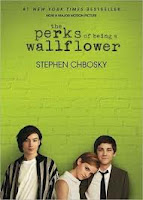 So, I finished The
Perks of Being a Wallflower a week or so ago and I wrote down a bunch of
topics I still wanted to write about. I
may or may not get to them all, but I wanted to do one culminating one that
looked at the big picture.
So, I finished The
Perks of Being a Wallflower a week or so ago and I wrote down a bunch of
topics I still wanted to write about. I
may or may not get to them all, but I wanted to do one culminating one that
looked at the big picture.
One question I asked myself is: could I recommend this
book? Some students who read it admitted
that it was a pretty graphic book. There
are pretty detailed descriptions of sex, rape, masturbation, drug use,
etc. So does that make it a bad book?
Not necessarily.
There are a lot of books that have some pretty raw stuff that I think
are worth reading. The Bible is one of
them. Romeo and Juliet is another.
Even the book that Perks is
attempting to emulate, The Catcher in the
Rye has some of these issues.
To me, though, what makes the above stories more readable is
that they can address some heavy subjects with a level of grace. Books that speak to us often show the world
as it is, including its more gritty side.
Yet masters of language can make us feel that grit without it feeling
raunchy. Perks seemed to cross into raunchy at times.
So, can I recommend it?
I don’t know. It depends on the
person. I want my kids to read Harry Potter…but not yet. There is a time when certain works of
literature or movies or music can enlighten even when muddling through gritty
aspects of life and there is a time when those same pieces can pull us down and
stir cravings and curiosity that can lead us to unhealthy choices. Each person has to make that call for
themselves.
But I want to end on what I see as the triumph of Perks and that is what I see to be its
dominant theme: Like Charlie, we need to
see the complexity of people’s lives and extend compassion to them. Charlie doesn’t label people. Even when he doesn’t like them or is hurt by
them, he is able to see the complexity of their life. Everyone has a story and everyone’s faults
have a story. We all share in the glory
of life and we all share in the gutter.
He sees both sides in everyone from his father, to Patrick, to his
ex-girlfriend Mary Elizabeth.
And, in the end, he even seems to see it in his Aunt Helen
who molested him. This is truly
shocking, but should it be, especially for those of us who call ourselves
Jesus-followers?
 Jesus protected and spoke love to a married woman who was
caught sleeping with a married man. He
had a dinner party with a notorious cheat named Zacchaeus and turned the man’s
heart. He looked over the city of
Jerusalem, the city that would eventually execute him, and had compassion
because they were “like sheep without a shepherd.“
Jesus protected and spoke love to a married woman who was
caught sleeping with a married man. He
had a dinner party with a notorious cheat named Zacchaeus and turned the man’s
heart. He looked over the city of
Jerusalem, the city that would eventually execute him, and had compassion
because they were “like sheep without a shepherd.“
He looked at people and he saw humanity-meaning he
recognized and loved the frailty of what it is to be human.
 I read The Catcher in
the Rye many years ago. It has been
considered the most powerful modern-day ‘coming-of-age’ novel. One scene has stuck in my mind since I read
it. The main character Holden, who is
lonely, decides to get a prostitute.
When she comes to his hotel room, he is struck by the fact that she is
his age and ultimately decides that all he wants to do is talk. The prostitute eventually gets annoyed and
leaves. Holden, like Charlie, and like Jesus sees
through the labels and sees a person, a person in all their crap, and sin, and
beauty, and pain, and longing, and dreams.
I read The Catcher in
the Rye many years ago. It has been
considered the most powerful modern-day ‘coming-of-age’ novel. One scene has stuck in my mind since I read
it. The main character Holden, who is
lonely, decides to get a prostitute.
When she comes to his hotel room, he is struck by the fact that she is
his age and ultimately decides that all he wants to do is talk. The prostitute eventually gets annoyed and
leaves. Holden, like Charlie, and like Jesus sees
through the labels and sees a person, a person in all their crap, and sin, and
beauty, and pain, and longing, and dreams.
That’s what I want to emulate from Charlie’s life. To see the people around me, even the ones
that frustrate me, as people with a history.
And I want to love them. I want
to be the hands and words of God to them.
Because I have a history too, but my history has been written with the
fingerprints of a Savior. He has touched
my crap, sin, beauty, pain, longing, and dreams. And I want Him to use me to help do the same
for the people I come in contact with.

No comments:
Post a Comment